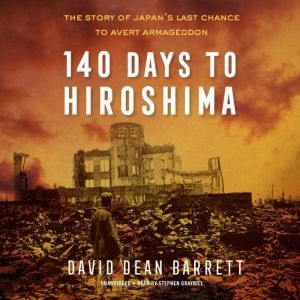Quotes
“Barrett drops you right into the situation rooms with the most powerful figures in the world during the most critical days of the 20th century—the climax of World War II. Innovatively structured, highly detailed, and well-documented, this book will draw you in from page one.” A.J. Baime, New York Times bestselling author
“A detailed, almost day-by-day account of political debates that preceded Japan’s surrender in World War II…A non-revisionist, reflective, opinionated, intensely researched WWII history.” Kirkus Reviews
“Historian Barrett debuts with an impressively researched chronicle of the months leading up to the atomic bombing of Hiroshima…By capturing both sides of the conflict, Barrett generates drama despite the inevitability of the book’s conclusion. Military history buffs will be riveted.” Publishers Weekly
“140 Days to Hiroshima is a deeply researched and carefully nuanced narrative, especially powerful on U.S. and Japanese decision-making throughout 1945, culminating in Japan’s surrender. David Dean Barrett shrewdly integrates essential military realities with the potent domestic cross currents affecting leaders on both sides of the Pacific.” Richard B. Frank, author of Downfall: The End of the Imperial Japanese Empire
“Reading like a Tom Clancy thriller, David Dean Barrett’s 140 Days to Hiroshima is a gripping, day-by-day account of the run-up to, and the aftermath of, one of the most cataclysmic and world-changing events of all time—the atomic bombing of two Japanese cities. Here’s the inside story of why the Japanese high command was so determined to continue a war they could not possibly win.” Flint Whitlock, editor of WWII Quarterly magazine and co-author of The Depths of Courage: American Submariners at War with Japan
“David Dean Barrett’s detailing of the ruling militarists’ iron grip on Japanese decision-making—even after two atomic bombs and the Soviet entry into the Pacific War—should finally put to rest any notion that the Japanese were trying to surrender. As 140 Days to Hiroshima clearly shows, it was the bomb that influenced the Emperor to make his historic interventions forcing his government to finally surrender. Yet even then, Japan’s military almost derailed Hirohito’s decree to end the war.” D. M. Giangreco, author of Hell to Pay: Operation Downfall and the Invasion of Japan, 1945–1947



